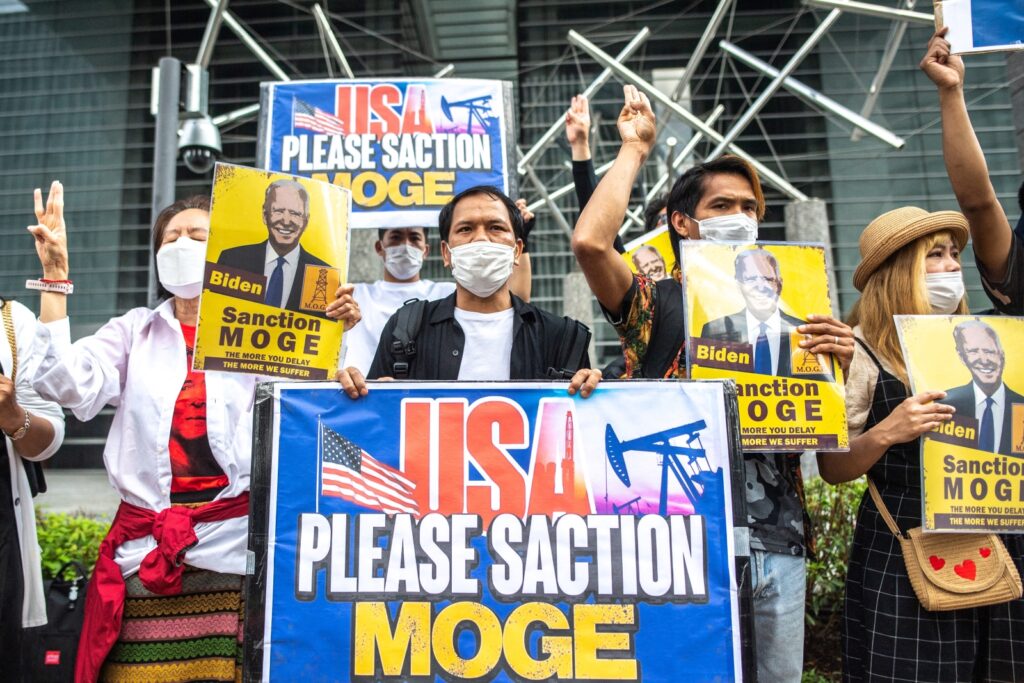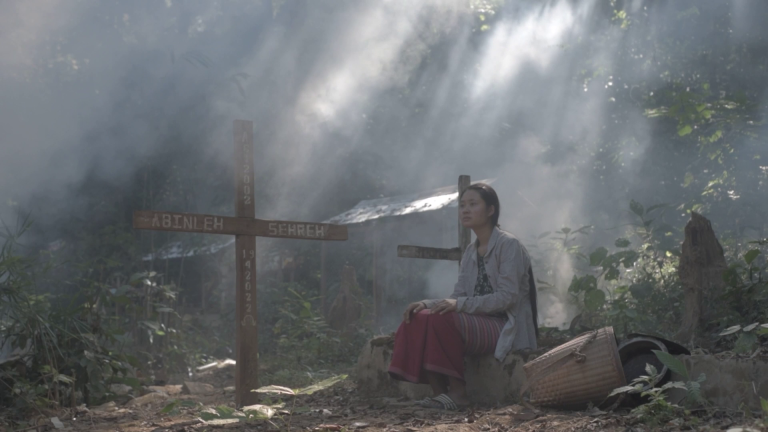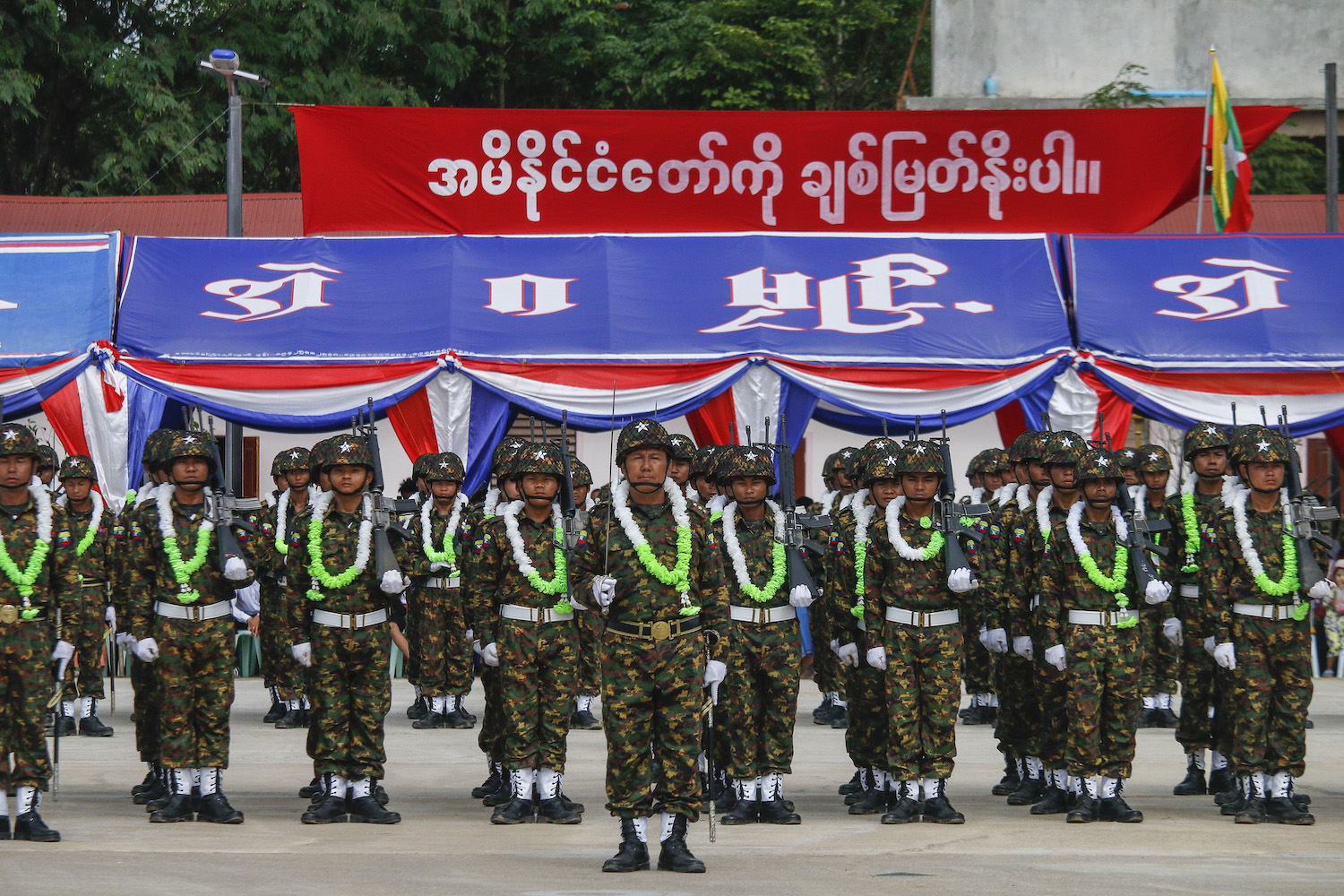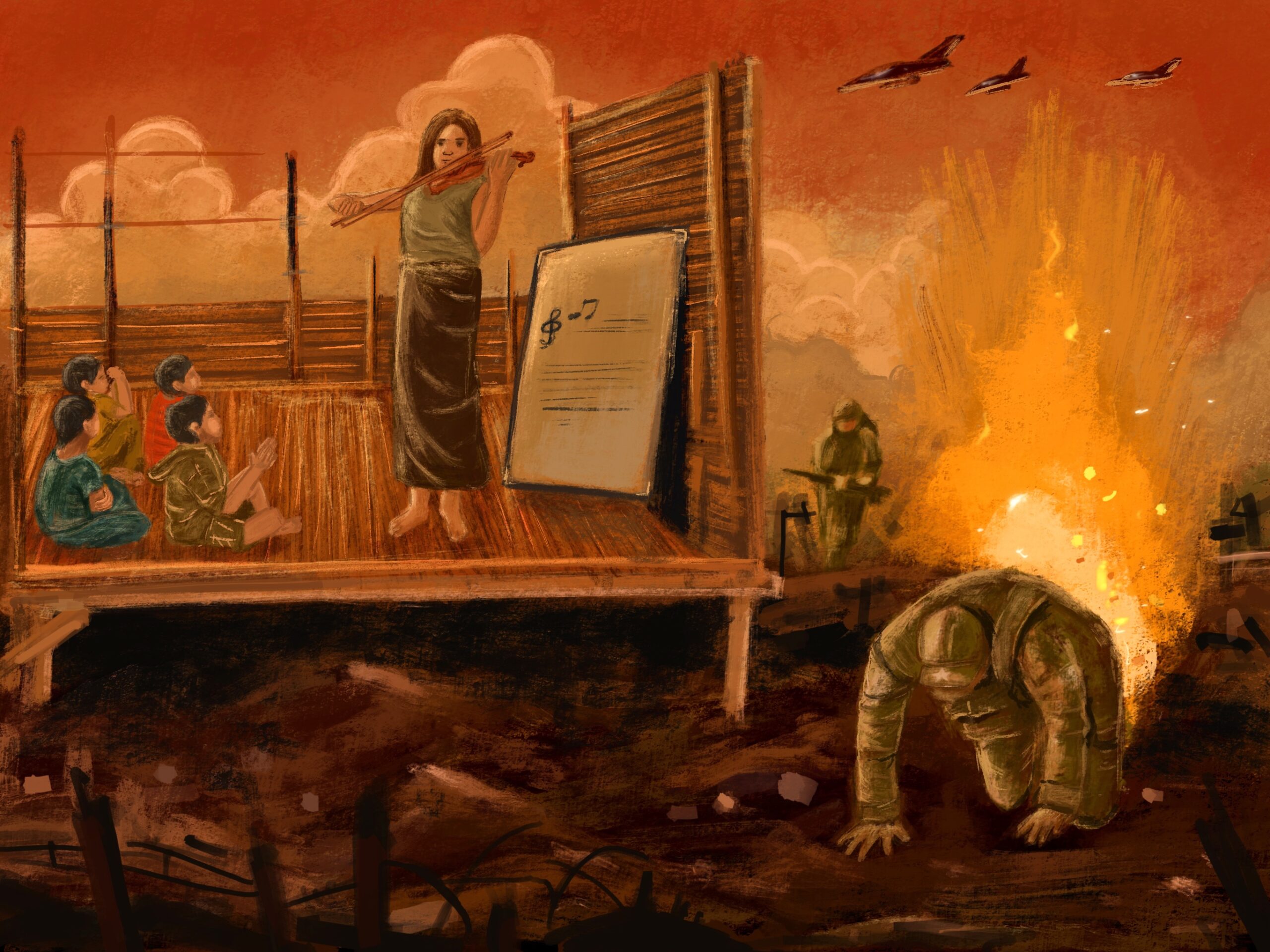OPINION
Coming into effect last week, United States sanctions on the Myanma Oil and Gas Enterprise won’t hit as hard as they could have, but they will still shrink the junta’s coffers while avoiding harm to the wider economy.
By MIKE HAACK | FRONTIER
When I joined the Free Burma Coalition’s “exposure trip” from the United States to the Thai-Myanmar border in 2002, all I wanted to know was how I could help. The democracy groups, aid workers and journalists we met all called for the same thing: sanctions.
It made sense. Growing-up in the US in the 1990s, I heard of how college students had pressured Congress to place game-changing sanctions on Apartheid South Africa. Later, as a college student myself, I joined a movement that was trying to do the same for Myanmar.
Then, as now, the academic literature on sanctions indicated that they tend to hurt regular people and generally fail to achieve their political goals. But, the logic went, sanctions on the Apartheid regime were different because they conformed to the will of the South African people, expressed by Nelson Mandela’s African National Congress. People willing to sacrifice for the cause would be empowered, not belittled, by the world heeding their leaders’ requests.
In an article for the International Herald Tribune in 1997, Daw Aung San Suu Kyi wrote that people around the world should “take a principled stand against companies that are doing business with the Burmese military regime”. Few doubted that the opposition leader was channelling the popular will in Myanmar, and her call for sanctions was backed by public figures ranging from US Republican Senator Mitch McConnell to leftist writer Naomi Klein. For my part, I set up a booth at my university’s student union and got passers-by to call their members of Congress in support of sanctions.
Hard lessons
What I didn’t know at the time was that the sanctions bill we were lobbying for was being held-up by Californian Senator Dianne Feinstein on behalf of Los Angeles-based oil giant Unocal, which was a minority shareholder in the Yadana offshore gas field and pipeline project in Myanmar until merging with fellow Californian firm Chevron in 2005. Colleagues later told me that, to get the sanctions through, activists agreed to exempt Unocal. The justification was that if the company divested from Yadana, a Chinese company would take over its share, keep the project going and inflict more harm on local communities.
However, when French company TotalEnergies, the largest shareholder and project operator, eventually divested from Yadana last year, its stake wasn’t acquired by a Chinese company. Instead, it was divided proportionally between the three remaining stakeholders: Chevron, the junta-controlled Myanma Oil and Gas Enterprise and Thailand’s PTT, which took over as the operator. The fearmongering about a Chinese takeover was unfounded.

Nonetheless, cutting off the junta’s main source of income was off the table in the early 2000s, and an import ban on Myanmar became the most expedient choice. It helped that the garment industry lobby, the American Apparel & Footwear Association, endorsed such as ban after consumer boycotts had pressured many of its members to cease sourcing from Myanmar. US labour groups also backed the idea.
And so, in apparent deference to the will of Myanmar’s people, the US included an import ban in the Burmese Freedom and Democracy Act of 2003. This was on top of a ban on new investments imposed in 1997.
But Myanmar isn’t South Africa. While the latter’s Apartheid regime governed a fully industrialised country that was wholly integrated into the global financial system, Myanmar’s junta was struggling to adopt the export-oriented development model pursued by much of Southeast Asia at the time.
The 2003 sanctions may have been the worst of all possible approaches. The hit to Myanmar’s low-margin, labour-intensive garment industry cost up to 80,000 jobs, while the generals could still get rich from oil and gas. Some have argued that energy exports to Thailand saved the regime from bankruptcy during this period.
The problem with basing a policy on the desires of those most affected by it is that policies are popular until they are not. Once in place, the sanctions soon lost local support, despite having been championed by Myanmar’s civil society. When I became the campaigns coordinator for the US Campaign for Burma in 2008, I soon learned that the National League for Democracy was publicly distancing itself from the sanctions while privately asking us to keep them in place. They didn’t want to be associated with an unpopular policy, but also saw the sanctions as a key piece of leverage against the military.
It was a difficult position to find oneself in, but I learned a great deal from the experience. Thankfully, expert policymakers in the US State Department and Treasury have learned as well. The post-1990 fixation on popular agency at the expense of structural factors is now dead. Although the recently unveiled sanctions are responding to calls from Myanmar civil society, they are also the result of careful calculations about the impact and, of course, the politics.
What will the sanctions do?
With the gas from the Yadana project dwindling and pressure on the company mounting, Chevron announced that it would withdraw from Myanmar two years ago, although the proposed sale of its stake to Canadian-owned MTI remains incomplete. More recently, the US business lobby stopped actively opposing MOGE sanctions and began to tell the relevant government departments that they could accept them. With no domestic opposition left, on October 31, the State Department and Treasury announced measures against MOGE, which went into effect on Friday, December 15.
The other major barrier to the sanctions had been objections from the Thai government. Although the proportion is shrinking, Thailand gets somewhere between 10-17 percent of its energy from Myanmar and has repeatedly told the US not to endanger its energy security in any way.
Advocates like me pushed back by citing the Bank of China’s reaction to European Union sanctions on MOGE, which showed Thailand could keep its lights on regardless. When the EU measures were imposed in February last year, the Chinese bank ceased payments to MOGE for oil and gas exports to China via the Shwe pipeline, seemingly because it feared losing access to banks in Europe and the Euro market. The junta didn’t want to suspend gas or oil deliveries to China, which it relies on for diplomatic support, so the pipeline has kept operating while revenue is being paid into an escrow account that the generals can’t access.
However, Thailand was still worried. So, to address the concerns of a longstanding US ally, the sanctions were written so that Thailand can get around them by making payments in Thai baht, rather than US dollars, through non-sanctioned banks.
By prohibiting “US persons from the provision, exportation, or re-exportation, directly or indirectly, of financial services to or for the benefit of MOGE or its property or interests in property”, the sanctions aim to “disrupt the regime’s access to the US financial system and curtail its ability to perpetrate atrocities”. Concretely, this means that any entity, regardless of nationality, will be barred from using US financial services to transact with MOGE. This makes it more difficult for the regime to access dollars, because most dollar transfers must go through US banks.
It might suit Thailand to pay for future oil and gas deliveries in baht, but it’s far less convenient for the Myanmar regime. The junta still relies on the dollar for most of its international trade, and since last year it has imposed capital controls and import restrictions in desperate attempts to conserve its US currency reserves. While it’s attempting to adopt other currencies for trade, this is a slow, difficult and costly process.
Such workarounds, however, will keep MOGE as the junta’s top foreign revenue earner and financial lifeline. Targeting all the enterprise’s overseas revenue, regardless of currency, would require “secondary” sanctions. These would cut off not only MOGE from US financial services, but any company that does business with it. This ban would apply to all the violating company’s operations and not just its Myanmar interests, potentially allowing the US government to seize whatever company assets it can gets its hands on.
A supporting role
Yet, despite stopping short of these “secondary” provisions, the new sanctions should be welcomed – as should the State Department’s measured approach to drafting them. It would have been easy for it to punch down and hit weaker industries with little US political support, as the 2003 Burma Freedom and Democracy Act did. Instead, it has applied pressure on the most powerful actor.
The State Department has also avoided calls to completely isolate Myanmar’s economy, or to turn the country’s conflict into a proxy for a new cold war with China, as desired by some hawks in Washington, DC. Some commentators have predicted the junta’s imminent collapse in the wake of Operation 1027, which since late October has seen resistance armies rout the junta in northern Shan State and has invigorated anti-junta groups elsewhere in the country. However, the safe money is still on a protracted conflict. It’s wise to continue planning for the long term.
As legitimate targets such as MOGE are taken out, pressure will mount for more risky moves such as sanctioning Myanmar’s biggest bank, KBZ, which some have called for already. This would hurt millions of ordinary Myanmar people who hold accounts with the bank or are paid by companies that do, or who use its popular mobile wallet KBZPay. Others have ignored the mistakes of the past and called for divestment from garment manufacturing. US tools of economic warfare have improved greatly over the past two decades, meaning there’s no reason to be so blunt.
A more patient and surgical approach should be pursued, going after the generals’ assets in bank accounts around the world and blocking sales of jet fuel to the military. But this approach should come with an awareness that, ultimately, the US can only play a supporting role in the struggle for democracy in Myanmar. Our desire to help must be balanced with a healthy amount of realism – and a willingness to learn from the past.
Mike Haack is an advocacy coordinator for the Myanmar Policy Institute in Washington, DC. All views expressed here are his own.







